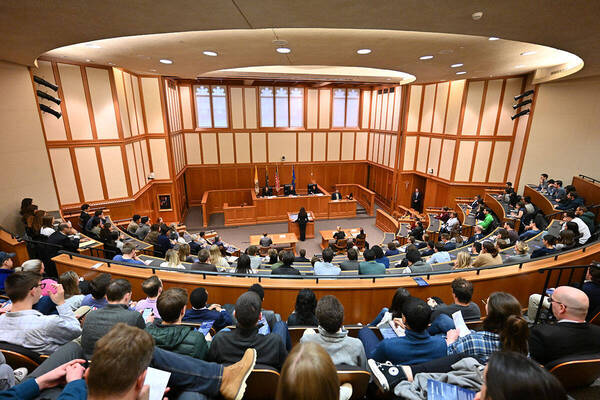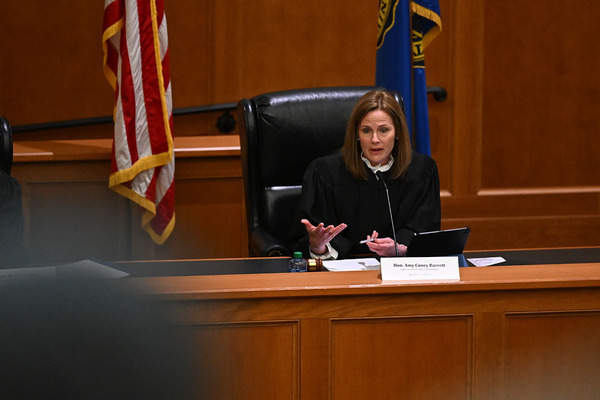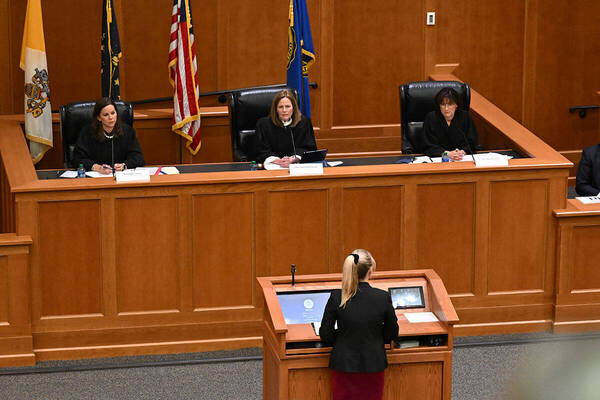Federal judges visit ND Law to hear 73rd annual Moot Court Showcase Argument

Four Notre Dame Law School students had the opportunity to argue a case in front of a panel of distinguished federal judges on Feb. 6 at the Law School’s 73rd annual Moot Court Showcase Argument.
The judges for this year’s showcase argument were Associate Justice Amy Coney Barrett of the Supreme Court of the United States, Judge Britt Grant of the U.S. Court of Appeals for the Eleventh Circuit, and Chief Judge Diane Sykes of the U.S. Court of Appeals for the Seventh Circuit.
The fictitious case chosen for the exercise, St. Agatha High School v. Vanessa Benson and the State of Hoynes, concerned a teacher at a Catholic school who was fired for creating social media posts that rejected and contradicted the school’s religious teachings. Third-year law students Olivia Rogers and Leo O’Malley advocated for the school’s position, while third-year law students Courtney Klaus and Elisabeth Crusey advocated for the teacher’s position.
The case involved issues such as whether the religion clauses prevent civil courts from adjudicating employment discrimination claims brought by an employee against her religious employer when the employee’s job description contains religious responsibilities, and whether the fictitious Hoynes Supreme Court erred in concluding that the state’s human rights act was neutral and generally applicable.
Notre Dame Law School hosts the annual Moot Court Showcase Argument for the primary purpose of providing first-year law students with an opportunity to see effective oral advocacy in action. The Law School’s McCartan Courtroom was filled to capacity with spectators on Feb. 6.
The three judges listened to the advocates and asked them questions for more than 45 minutes before concluding the argument and offering feedback to the students. Barrett quipped that the judges were “in the fortunate position of neither having to decide the case, write an opinion nor pick a winner.”

Barrett complimented Rogers, O’Malley, Klaus and Crusey on their presence and composure. She observed that the students did not rely on their notes during oral advocacy and that they were willing to embrace the implications of their arguments and where their arguments would lead. Those are marks of good oral advocates, Barrett said.
Grant added that the students did a good job of being conversational with the judges, embracing the judges’ questions and being open to what those on the bench wanted to hear about the case.
Sykes called the students “excellent oral advocates.” In addition, Sykes said she was impressed with the students’ complete command of the legal material relevant to the case.
“I am incredibly grateful to Justice Barrett, Judge Sykes and Judge Grant. Their willingness to support and encourage future generations of lawyers is an inspiration,” O’Malley said after the showcase argument. “It is hard to describe the mix of emotions I had stepping up to the podium in the McCartan Courtroom. Suffice it to say, arguing in front of such a distinguished panel is an experience that I will always remember.”
Klaus, Crusey and Rogers also said they were honored to have the opportunity to argue in front of a Supreme Court justice and two federal Court of Appeals judges.

“It’s a tremendous privilege that not many people — let alone law students — get to experience. It’s something I’m going to remember for the rest of my life,” Klaus said.
Crusey said, “Participating in this year’s showcase argument taught me valuable skills in oral advocacy, which I will carry with me throughout my career. We are deeply grateful for everybody’s time and support of Notre Dame Moot Court.”
Rogers said, “Arguing in front of such a distinguished panel of judges would be an honor and privilege at any point in my career, and even more so as a student. I really enjoyed diving into religious liberty issues to prepare for the showcase, and am so thankful to my teammates, professors and the judges for making this possible.”
The Moot Court Showcase Argument is put on each year by student members of the Notre Dame Law School Moot Court Board.
“The annual showcase argument is really a testament to amazing opportunities that Notre Dame Law School provides to its students,” O’Malley said. “I feel so blessed to have been part of this longstanding tradition and would like to thank everyone who made this year’s event possible.”
Klaus added, “I want to thank my amazing teammates who worked for months to make this happen. We all care a lot about setting a good example of appellate advocacy for the 1Ls and being a part of this awesome tradition. I couldn’t be prouder of everyone.”
Visit law.nd.edu/mootcourt to learn more about Moot Court at Notre Dame Law School.
Originally published by at law.nd.edu on Feb. 14.
Latest Colleges & Schools
- Prioritizing prenatal care may decrease low birth weight outcomes in The Gambia, Notre Dame research findsA new study co-authored by University of Notre Dame researchers highlights the importance of prenatal care for improving the health of mothers and newborns, providing evidence that can inform policy.
- Partial peace deals may facilitate comprehensive accords, offering roadmap for policymakers, practitionersPartial peace agreements — deals that address targeted issues on the way to larger comprehensive accords — could provide a blueprint for peacebuilding policymakers and practitioners, according to new University of Notre Dame research.
- Notre Dame Law School launches new Veterans Law ClinicNotre Dame Law School is launching a new Veterans Law Clinic, dedicated to providing free legal assistance to U.S. military veterans in matters such as disability claims and appeals.
- City of Gary and Notre Dame’s Housing and Community Regeneration Initiative announce vision and action plan for downtown GaryThe City of Gary and the University of Notre Dame School of Architecture’s Housing and Community Regeneration Initiative announced a “Vision and Action Plan” for downtown Gary during a news conference Tuesday (May 27). The final report serves as a roadmap for Gary’s leadership to follow to reestablish the city’s building culture.
- Notre Dame Executive MBA offers scholarships to area leadersMichiana Forty under 40 honorees can receive $30,000 toward tuition for the Notre Dame EMBA program.
- Kenneth Scheve appointed dean of the University of Notre Dame’s College of Arts and LettersKenneth Scheve, the Dean Acheson Professor of Political Science and Global Affairs and the dean of social science at Yale University, has been appointed the I.A. O’Shaughnessy Dean of the College of Arts and Letters by University of Notre Dame President Rev. Robert A. Dowd, C.S.C. Scheve, who will also hold a tenured faculty position in the Department of Political Science, begins a five-year term as dean on July 1.













